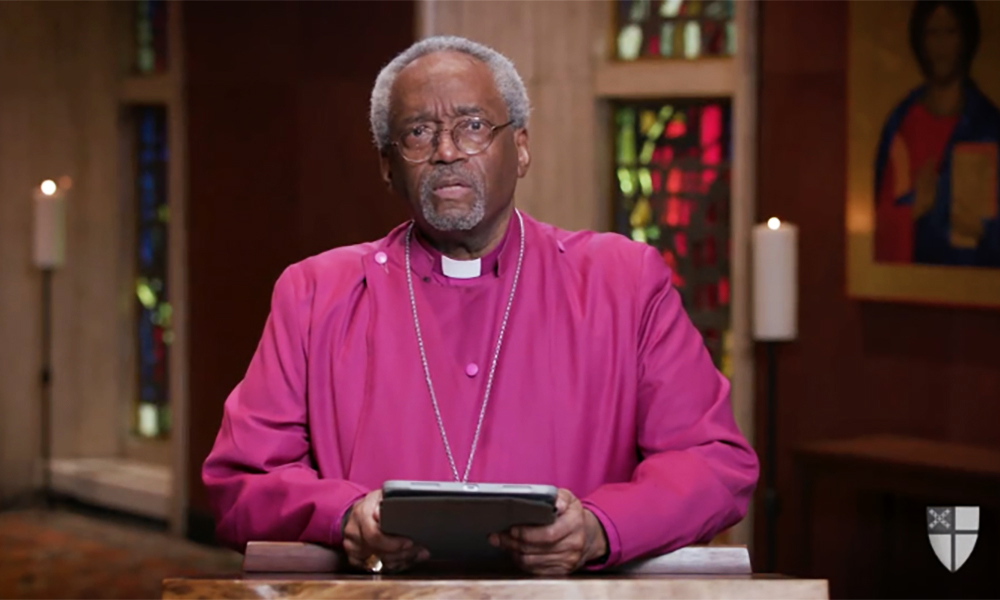Bishop Alan M. Gates and Bishop Gayle E. Harris have issued the following directive, effective immediately and until further notice. It replaces previously issued guidelines. A Spanish-language version will be available as soon as possible. The directive is available in full as a PDF here and on the diocesan website here.
March 11, 2020
Dear People of the Diocese of Massachusetts,
As cases of the coronavirus COVID-19 increase rapidly in Massachusetts, we seek to respond in a manner that both takes appropriate precautions to protect our communities and to reduce the anxiety and fear associated with this public health crisis. We have assembled a small group of persons who bring expertise in epidemiology, public health and disaster response to provide guidance for our congregations and related organizations, drawing on the wisdom of public health officials and focusing on matters specific to church contexts.
Based on their counsel, we are today issuing the mandates detailed below, which are effective immediately and until further notice. They include significant changes that the current circumstances now call for, including that communion is to be distributed in the form of consecrated bread only; offering plates are not to be passed among the people; and at the Peace people should greet one another without physical touch of any kind. We ask you to read in full and heed the mandated protocols and additional recommended practices detailed below. These mandates and recommendations replace previously distributed guidelines.
We are deeply grateful for all the ways that you are already caring for one another and all the ways you will continue to do so in the days ahead. We ask that you keep up your efforts to check on and find ways to support those who are vulnerable, isolated, unwell or in quarantine, through prayer, phone and video calls and errands. Thank you for continuing to be mindful of those whose incomes may be disrupted during this time. Include in your unceasing prayers those who are medical care providers and first responders, and those who are at higher risk of exposure because of their direct public service.
As we said in last week’s messages, it is important to continue to stay informed via credible sources. Stay connected by all means available, while remembering, as part of our self-care, to take intentional time away from newsfeeds and devices, for the prayer, quiet and restorative activity that will return us less anxious and more ready to serve Christ in the days ahead.
As Presiding Bishop Michael Curry reminds all of us in his March 10 statement: We are in this together.
Faithfully,
The Rt. Rev. Alan M. Gates
The Rt. Rev. Gayle E. Harris
COVID-19 Response
Mandated Protocols as of March 11, 2020
Preparing for a service:
• Baptismal fonts and holy water stoups are to be cleansed and are to remain empty unless there is a baptism. Ministers of baptism are to wash their hands with soap and warm water prior to the service and use hand sanitizer immediately before the baptismal rite.
• Altar rails, processional crosses, torches and other liturgical implements are to be cleansed with a disinfectant prior to and after each use.
• Altar Guild members are to wash their hands with soap and warm water prior to handling communion vessels.
At the Eucharist:
• All ministers of communion are to wash their hands with soap and warm water for at least 30 seconds immediately prior to the service, and to use a hand sanitizer of at least 60% alcohol content immediately prior to the Eucharistic Prayer. If a large number of persons is present, use of hand sanitizer should be repeated during the distribution of communion. If hand sanitizer is unavailable, ministers of communion should wash their hands with soap and warm water immediately prior to handling communion vessels.
• At the Peace, the people should greet one another without physical touch of any kind. A gentle bow, nod or namaste gesture is preferable. Elbow bumps are discouraged since people are encouraged to sneeze into their elbow to reduce the chance of transmitting the virus.
• Offering plates are not to be passed among the people. Plates or baskets should be placed in a location where the people may leave their offering. Ministers of communion are not to touch offering plates if they are presented at the altar.
• The Eucharistic Prayer is to be said as usual, with a single chalice containing a small amount of the consecrated wine to remain on the altar during communion. The consecrated wine should be returned to the earth in a reverent manner, or, if preferred, the celebrant alone may consume it.
Concerning the distribution of communion:
• Communion is to be distributed in the form of consecrated bread only. Wafers should be used instead of baked bread. It is perfectly acceptable, and sound theology, for communion to be received in one kind.
• The consecrated wafer is to be delivered into the recipient’s hand, to avoid the communion minister’s hands touching the mouth of the recipient.
• When offering a blessing instead of communion, extend a hand or make the sign of the cross over the person rather than touching them.
Caring for one another:
• At healing rites, ministers are to cleanse their hands with hand sanitizer immediately before laying-on-of-hands and anointing of each person. Only the designated healing minister is to pray with the person; groups are not to surround the person.
• Clergy and other visitors to homebound or hospitalized persons, or those in care facilities, are to use hand sanitizer immediately before and after visiting with the sick or infirm person. Anyone who feels or, at any time during the prior two weeks, has felt unwell or run a fever is to refrain from home, hospital or nursing home visits.
• Respect all safety protocols of hospitals or other care facilities.
• Clergy are to respect the confidentiality of patients and all parishioners at all times and are to follow the directives of their local public health authorities.
Strongly Recommended Practices
• Hand sanitizer with at least 60% alcohol content should be made available to all attending church services and events.
• Remind people to cover coughs and sneezes.
• Common areas, bathrooms and classrooms, especially handrails, doorknobs and faucets, should be cleaned and disinfected frequently and prior to each gathering.
• Virtual gatherings* are encouraged where possible. Church or program staff may be encouraged to work from home, provided their physical presence is not required.
• Food served at coffee hour, feeding programs or other gatherings should be in individual servings. If food is not in individual servings, a person wearing a new pair of food service gloves should be assigned to pre-plate and serve the food. Serving utensils should be handled only by the person preparing and/or serving the food.
• Persons who feel, or within the past two weeks, have felt unwell or run a fever are discouraged from attending church services or events, both for their own protection and the protection of others. If anyone in a household is unwell, everyone in the household should remain at home. In particular, the following persons who are at particular risk from COVID -19 should take extra precautions:
• Persons age 60 or over
• Anyone with a respiratory condition such as asthma or emphysema
• Anyone with an autoimmune disorder
• Anyone who is undergoing or has recently received chemotherapy
• Smokers


